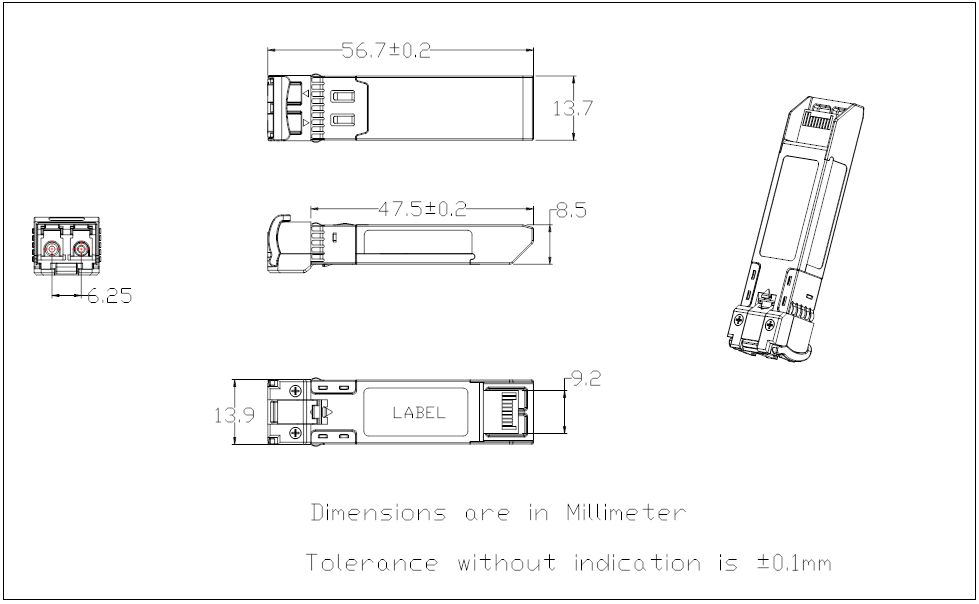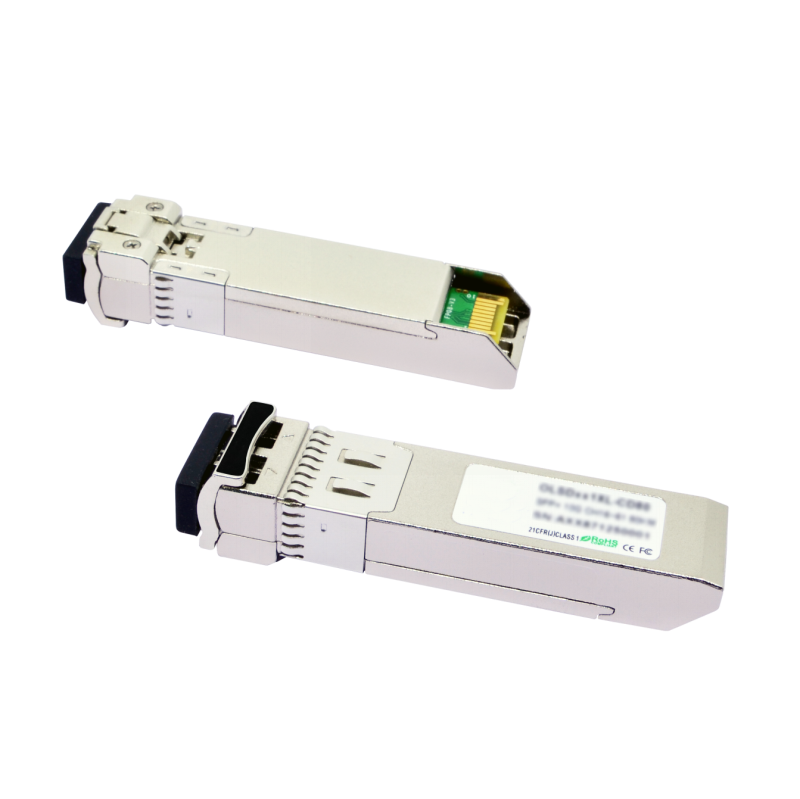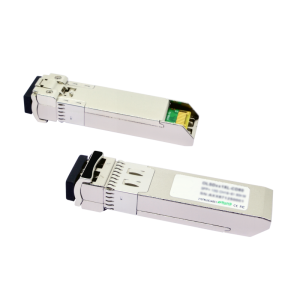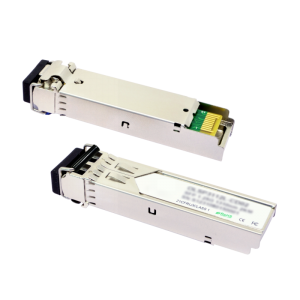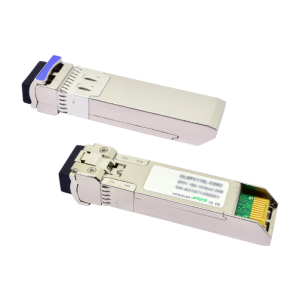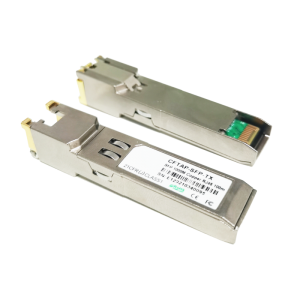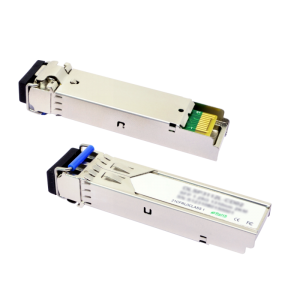Mylinking™ Optical Transceiver Module SFP+ LC-MM 850nm 300m
ML-SFP+MX 10Gb/s SFP+ 850nm 300m LC Multi-Mode
Product Features
● Supports up to 11.3Gb/s bit rates
● Duplex LC connector
● Hot pluggable SFP+ footprint
● 850nm VCSEL transmitter, PIN photo-detector
● Up to 300m on 50/125um MMF(2000MHZ.KM)
● Low power consumption, < 1W
● Digital Diagnostic Monitor Interface
● Optical interface compliant to IEEE 802.3ae
● Electrical interface compliant to SFF-8431
● Operating case temperature:
Commerical:0~70°C Industrial:-40 to 85 °C
Applications
● 10G Base-SR/SW at 10.3125G
● 10G Fiber Channel
● Other optical links
Functional Diagram
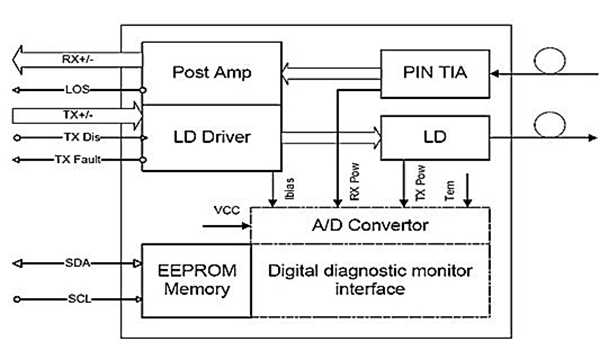
Absolute Maximum Ratings
|
Parameter |
Symbol |
Min. |
Max. |
Unit |
Note |
| Supply Voltage |
Vcc |
-0.5 |
4.0 |
V |
|
| Storage Temperature |
TS |
-40 |
85 |
°C |
|
| Relative Humidity |
RH |
0 |
85 |
% |
Note: Stress in excess of the maximum absolute ratings can cause permanent damage to the transceiver.
General Operating Characteristics
|
Parameter |
Symbol |
Min. |
Typ |
Max. |
Unit |
Note |
| Data Rate |
DR |
9.953 |
10.3125 |
11.3 |
Gb/s |
|
| Supply Voltage |
Vcc |
3.13 |
3.3 |
3.47 |
V |
|
| Supply Current |
Icc5 |
|
300 |
mA |
||
| Operating Case Temp. |
Tc |
0 |
70 |
°C |
||
|
TI |
-40 |
85 |
Electrical Characteristics (TOP(C) = 0 to 70 ℃, TOP(I) =-40 to 85 ℃, VCC = 3.13 to 3.47 V)
|
Parameter |
Symbol |
Min. |
Typ |
Max. |
Unit |
Note |
|
Transmitter |
||||||
| Differential data input swing |
VINPP |
180 |
700 |
mVpp |
1 |
|
| Transmit Disable Voltage |
VD |
VCC-0.8 |
Vcc |
V |
||
| Transmit Enable Voltage |
VEN |
Vee |
Vee+0.8 |
|||
| Input differential impedance |
Rin |
100 |
Ω |
|||
|
Receiver |
||||||
| Differential data output swing |
Vout,pp |
300 |
850 |
mVpp |
2 |
|
| Output rise time and fall time |
Tr, Tf |
28 |
Ps |
3 |
||
| LOS asserted |
VLOS_F |
2 |
Vcc_HOST |
V |
4 |
|
| LOS de-asserted |
VLOS_N |
Vee |
Vee+0.8 |
V |
4 |
|
Note:
1. Connected directly to TX data input pins. AC coupling from pins into laser driver IC.
2. Into 100Ω differential termination.
3. 20 – 80%. Measured with Module Compliance Test Board and OMA test pattern. Use of four 1’s and four 0’s sequence in the PRBS 9 is an acceptable alternative.
4. LOS is an open collector output. Should be pulled up with 4.7kΩ – 10kΩ on the host board. Normal operation is logic 0; loss of signal is logic 1.
Optical Characteristics (TOP(C) = 0 to 70 ℃, TOP(I) =-40 to 85 ℃,VCC = 3.13 to 3.47 V)
|
Parameter |
Symbol |
Min. |
Typ |
Max. |
Unit |
Note |
|
Transmitter |
||||||
| Operating Wavelength |
λ |
810 |
850 |
880 |
nm |
|
| Ave. output power (Enabled) |
PAVE |
-6 |
0 |
dBm |
1 |
|
| Extinction Ratio |
ER |
3.5 |
dB |
|||
| RMS spectral width |
Δλ |
0.85 |
nm |
|||
| Rise/Fall time (20%~80%) |
Tr/Tf |
50 |
ps |
2 |
||
| Dispersion penalty |
TDP |
2 |
dB |
|||
| Output Optical Eye | Compliant with IEEE 0802.3ae | |||||
|
Receiver |
||||||
| Operating Wavelength |
840 |
850 |
860 |
nm |
||
| Receiver Sensitivity(ER=4.5) |
PSEN1 |
-11.1 |
dBm |
3 |
||
| Overload |
PAVE |
0.5 |
dBm |
|||
| LOS Assert |
Pa |
-30 |
dBm |
|||
| LOS De-assert |
Pd |
-12 |
dBm |
|||
| LOS Hysteresis |
Pd-Pa |
0.5 |
dB |
|||
Notes:
1. Measured at 10.3125b/s with PRBS 231 – 1 NRZ test pattern.
2. 20%~80%
3. Under the ER worst case=4.5@ 10.3125 Gb/s with PRBS 231 - 1 NRZ test pattern for BER < 1x10-12
Pin Definitions And Functions
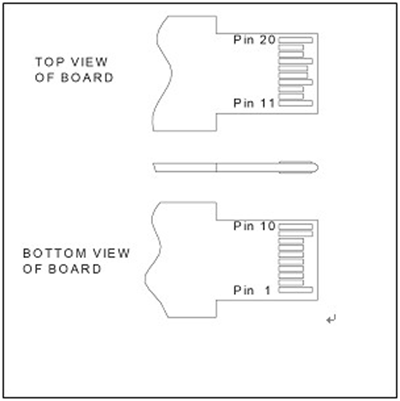
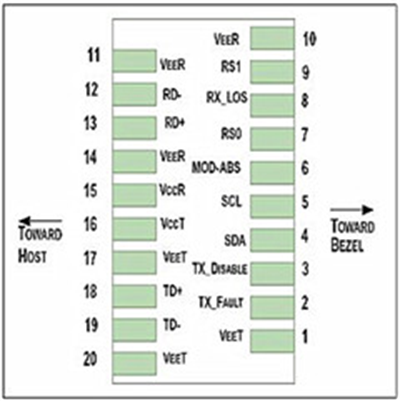
|
Pin |
Symbol |
Name/Description |
|
1 |
VEET [1] | Transmitter Ground |
|
2 |
Tx_FAULT [2] | Transmitter Fault |
|
3 |
Tx_DIS [3] | Transmitter Disable. Laser output disabled on high or open |
|
4 |
SDA [2] | 2-wire Serial Interface Data Line |
|
5 |
SCL [2] | 2-wire Serial Interface Clock Line |
|
6 |
MOD_ABS [4] | Module Absent. Grounded within the module |
|
7 |
RS0 [5] | Rate Select 0 |
|
8 |
RX_LOS [2] | Loss of Signal indication. Logic 0 indicates normal operation |
|
9 |
RS1 [5] | Rate Select 1 |
|
10 |
VEER [1] | Receiver Ground |
|
11 |
VEER [1] | Receiver Ground |
|
12 |
RD- | Receiver Inverted DATA out. AC Coupled |
|
13 |
RD+ | Receiver DATA out. AC Coupled |
|
14 |
VEER [1] | Receiver Ground |
|
15 |
VCCR | Receiver Power Supply |
|
16 |
VCCT | Transmitter Power Supply |
|
17 |
VEET [1] | Transmitter Ground |
|
18 |
TD+ | Transmitter DATA in. AC Coupled |
|
19 |
TD- | Transmitter Inverted DATA in. AC Coupled |
|
20 |
VEET [1] | Transmitter Ground |
Notes:
1.Module circuit ground is isolated from module chassis ground within the module.
2.should be pulled up with 4.7k – 10k ohms on host board to a voltage between 3.15Vand 3.6V.
3.Tx_Disable is an input contact with a 4.7 kΩ to 10 kΩ pullup to VccT inside the module.
4.Mod_ABS is connected to VeeT or VeeR in the SFP+ module. The host may pull this contact up to Vcc_Host with a resistor in the range 4.7 kΩ to10 kΩ.Mod_ABS is asserted “High” when the SFP+ module is physically absent from a host slot.
5. RS0 and RS1 are module inputs and are pulled low to VeeT with > 30 kΩ resistors in the module.
Serial Interface for ID and Digital Diagnostic Monitor
The SFP+MX transceiver support the 2-wire serial communication protocol as defined in the SFP+ MSA. The standard SFP+ serial ID provides access to identification information that describes the transceiver’s capabilities, standard interfaces, manufacturer, and other information. Additionally, This SFP+ transceivers provide an enhanced digital diagnostic monitoring interface, which allows real-time access to device operating parameters such as transceiver temperature, laser bias current, transmitted optical power, received optical power and transceiver supply voltage. It also defines a sophisticated system of alarm and warning flags, which alerts end-users when particular operating parameters are outside of a factory set normal range.
The SFP MSA defines a 256-byte memory map in EEPROM that is accessible over a 2-wire serial interface at the 8 bit address 1010000X(A0h), so the originally monitoring interface makes use of the 8 bit address(A2h), so the originally defined serial ID memory map remains unchanged. The structure of the memory map is shown in Table1.
Table 1. Digital Diagnostic Memory Map (Specific Data Field Descriptions)
Digital Diagnostic Specifications
The SFP+MX transceivers can be used in host systems that require either internally or externally calibrated digital diagnostics.
|
Parameter |
Symbol |
Units |
Min. |
Max. |
Accuracy |
Note |
| Transceiver temperature | DTemp-E |
ºC |
-45 |
+90 |
±5ºC |
1 |
| Transceiver supply voltage | DVoltage |
V |
2.8 |
4.0 |
±3% |
|
| Transmitter bias current | DBias |
mA |
0 |
80 |
±10% |
2 |
| Transmitter output power | DTx-Power |
dBm |
-7 |
+1 |
±2dB |
|
| Receiver average input power | DRx-Power |
dBm |
-13 |
0 |
±2dB |
Notes:
1. Internally measured
2. The accuracy of the Tx bias current is 10% of the actual current from the laser driver to the laser
Typical Interface Circuit
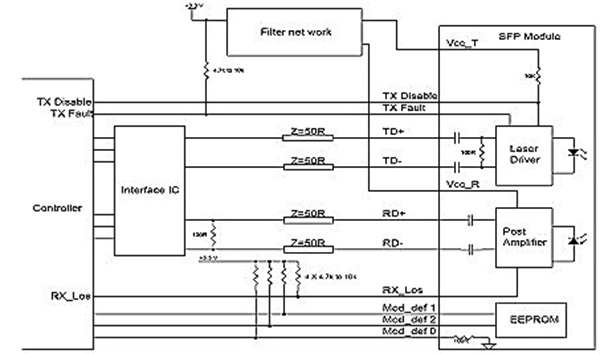
Recommended Power Supply Filter
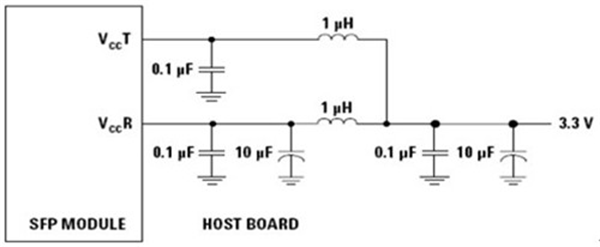
Note:
Inductors with DC resistance of less than 1Ω should be used in order to maintain the required voltage at the SFP input pin with 3.3V supply voltage. When the recommended supply filtering network is used, hot plugging of the SFP transceiver module will result in an inrush current of no more than 30 mA greater than the steady state value
Package Dimensions
